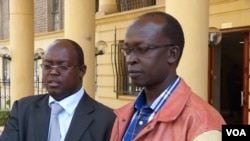A Kenyan court plans to rule Friday on the International Criminal Court’s (ICC) extradition request for activist Walter Barasa. The Hague-based court accuses him of interfering with witnesses. Barasa denies the accusation as without merit.
“I’m comfortable, because I deny allegations leveled against me, and much of it my lawyer has it and will [introduce] it in due course,” said Barasa.
The ICC issued an arrest warrant against Barasa, but he challenged the extradition order in a Kenyan court.
Barasa’s defense attorney Kibe Mungai accused the ICC of undermining the country’s constitution. He says, for example, his case should be tried in Kenyan courts, and also that the ICC move violates his constitutional rights to see evidence against him. The Kenyan Office of the Prosecutor says he can only see the information if he cooperates with the international court.
“Mr. Barasa wants the court to declare that the government of Kenya cannot oblige the request by the ICC,” said Mungai. “If he succeeds, that is the end of the story. If he also succeeds on the other part that the trial should be in Kenya, then the issue of warrant comes to an end. If he does not succeed then he may be surrendered in due cause to the ICC.”
Mungai says if the court upholds Kenya’s constitution, his client would not be subjected to extradition or to arrest by the ICC. He said both the ICC and Kenya erred in issuing a warrant for Barasa.
“Our chances are good,” said Mungai. “The ICC has been acting illegally in this matter and the state [Kenya] has misinterpreted the law in issuing the request for surrender.”
The ICC accused Barasa of bribing witnesses in the trial of Kenya’s deputy President William Ruto. The court accuses Mr. Ruto and President Uhuru Kenyatta of playing a key role in the country’s 2007-2008 post-election violence that left about 1,300 people dead and tens of thousands internally displaced. Barasa denies the ICC charges.
Defense attorney Mungai says the ICC’s arrest warrant against Barasa flouts Kenya’s constitution.
“Under the laws of Kenya to implement the Rome Statute [establishing the court], the trial for those offenses is supposed to be in Kenya and even after issuing the warrant and knowing that Kenya is a signatory state, they tried to arrest Mr. Barasa unlawfully,” said Mungai. “All these issues will be raised in the Kenyan court [Friday and] I am confident that we shall succeed.”
In a related matter, the Kenyan Daily Nation newspaper quotes the ICC coordinator for Kenya and Uganda, as saying that Kenya could try Barasa if the country’s courts are equipped to handle the case.
“I’m comfortable, because I deny allegations leveled against me, and much of it my lawyer has it and will [introduce] it in due course,” said Barasa.
The ICC issued an arrest warrant against Barasa, but he challenged the extradition order in a Kenyan court.
Barasa’s defense attorney Kibe Mungai accused the ICC of undermining the country’s constitution. He says, for example, his case should be tried in Kenyan courts, and also that the ICC move violates his constitutional rights to see evidence against him. The Kenyan Office of the Prosecutor says he can only see the information if he cooperates with the international court.
“Mr. Barasa wants the court to declare that the government of Kenya cannot oblige the request by the ICC,” said Mungai. “If he succeeds, that is the end of the story. If he also succeeds on the other part that the trial should be in Kenya, then the issue of warrant comes to an end. If he does not succeed then he may be surrendered in due cause to the ICC.”
Mungai says if the court upholds Kenya’s constitution, his client would not be subjected to extradition or to arrest by the ICC. He said both the ICC and Kenya erred in issuing a warrant for Barasa.
“Our chances are good,” said Mungai. “The ICC has been acting illegally in this matter and the state [Kenya] has misinterpreted the law in issuing the request for surrender.”
The ICC accused Barasa of bribing witnesses in the trial of Kenya’s deputy President William Ruto. The court accuses Mr. Ruto and President Uhuru Kenyatta of playing a key role in the country’s 2007-2008 post-election violence that left about 1,300 people dead and tens of thousands internally displaced. Barasa denies the ICC charges.
Defense attorney Mungai says the ICC’s arrest warrant against Barasa flouts Kenya’s constitution.
“Under the laws of Kenya to implement the Rome Statute [establishing the court], the trial for those offenses is supposed to be in Kenya and even after issuing the warrant and knowing that Kenya is a signatory state, they tried to arrest Mr. Barasa unlawfully,” said Mungai. “All these issues will be raised in the Kenyan court [Friday and] I am confident that we shall succeed.”
In a related matter, the Kenyan Daily Nation newspaper quotes the ICC coordinator for Kenya and Uganda, as saying that Kenya could try Barasa if the country’s courts are equipped to handle the case.





